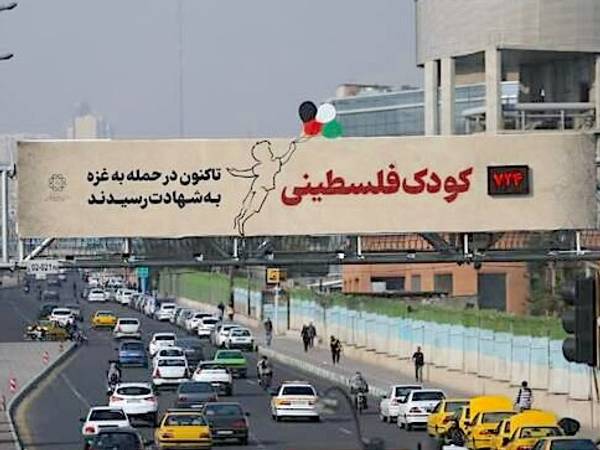Iranian perspectives on the conflicts in the Middle East are mostly dominated by the prevailing resentment toward their own rulers.
“The enemy of my enemy is my friend” is a prevailing logic vis-a-vis the Israeli-Palestinian conflict, overshadowing political, even humanitarian, sentiments.
Across Tehran, banners urging support for Palestinian and Lebanese war victims have become a common sight. One banner calls on citizens to sponsor displaced Lebanese families. On state TV, women are featured donating their gold and jewelry for Gaza and Lebanon. But this is not the whole story—far from it, in fact.
“These campaigns to support Gaza and Lebanon are sickening. They target people who can’t even afford bread. Money that could help Iranians escape poverty is funneled into Gaza and Lebanon.” This is my friend Safoora, a 38-year-old graphic designer. She jumps in when I ask our rideshare driver what he thinks about the pro-Palestinian billboards. The driver nods in agreement, half-glancing at Safoora in the rear-mirror.
“I agree with every word,” he joins in. “The government pours oil revenues into Gaza and Lebanon while our own people suffer. They wanted a Shiite crescent in the region, but look at what happened to the IRGC commanders and the leaders of Hamas and Hezbollah. They spent our money for nothing.”
No reliable data exists on Iranians’ view of regional politics. But anecdotal evidence suggests the views shared by Safoora and Kamran the driver are typical.
Iran’s strategy of backing armed groups against Israel and the United States has not sat well with much of the Iranian population. The discontent is evident in everyday conversations. And it’s cried out in almost every collective act of protest in recent years: “No to Gaza, no to Lebanon, (I give) my life for Iran”.
The laws of the Islamic Republic criminalize travel to Israel or expressing support for it. Iranian athletes are barred from competing against Israelis in international events.
Until recently, even using the word “Israel” in publications (instead of the “Zionist regime”) could mean serious trouble. Then there's the annual, state-sponsored Quds Day rally in solidarity with the Palestinian cause.
This one-sided approach has alienated many Iranians, who increasingly link the country’s economic woes to its regional policies.
Apathy and resentment are prevalent. Those feeling differently—those sympathetic to Palestinians and critical of Israel— often keep quiet to avoid “pro-regime” and “apologist” labels.
“The regime has monopolized and corrupted the Palestinian issue,” says Roya, a 34-year old activist from Iran’s Kurdish region. “It’s almost impossible to express support for Palestinians when the public is so hostile or indifferent at best."
"People who oppose Israel’s killing of civilians feel trapped. We want to protest these atrocities, but we don’t want to be associated with the regime and its propaganda,” she added.
Last month, more than 400 Iranian academics, writers, and activists inside and outside Iran signed a letter condemning Israel’s actions in Gaza.
The letter sparked backlash on social media. The signatories were called hypocrites for not criticizing the Islamic Republic equally. They responded that Iran’s stance was irrelevant to their concern about what they called genocide.
“Why do they condemn Israel but not Hamas? Why are they not so vocal when the regime executes protesters?” said Alireza, 29, works in a tech-support company. He believes it’s “stupid at best” to be concerned about Palestinians. “We have enough injustice to deal with at home,” he added.
His coworker, Babak, snaps at him. “So I’m stupid if I’m mad about kids being killed by Israel?” He turns to me, “I often think we’re blinded by our hatred for the Islamic Republic. We happily ignore or condone any crime if we think it’s somehow against our government.”
The debate surrounding Israel and Palestine is a microcosm of Iran’s internal struggles. For many Iranians, animus toward the Islamic Republic overshadows everything, including humanitarian sentiments. Life is tough here—too tough, often, for empathy to get the better of cynicism.
